Partnership seeks a hydrogen-based power generation solution for data centers
10 April 2025
Mesa Solutions and Modern Hydrogen are joining forces.
Beyond the design and technical challenges, a major obstacle to adoption of hydrogen in any equipment application is the uncertainty as to whether sufficient quantities and quality of the fuel — and the infrastructure to deliver it — will be available to support customer needs. The cost to produce the hydrogen and the resulting higher cost to end users are also factors.
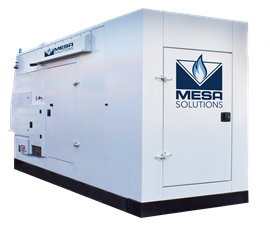 Mesa Solutions plans to produce a fully hydrogen-fueled generator set similar to its natural gas models. (Photo: Mesa Solutions)
Mesa Solutions plans to produce a fully hydrogen-fueled generator set similar to its natural gas models. (Photo: Mesa Solutions)
Mesa Solutions, a Loveland, Colo.-based provider of on-site power generation, and Modern Hydrogen, a provider of distributed hydrogen and carbon management based in Bothell, Wash., are joining forces with the objective of overcoming these obstacles in select markets.
At PowerGen International 2025 in Dallas, Texas, the two companies signed a memorandum of understanding (MoU) that formally established a partnership to develop a new power generation offering for data centers. The partnership will combine Mesa’s expertise in multi-megawatt gen-sets with Modern Hydrogen’s distributed technology for converting natural gas into hydrogen.
Hydrogen-Fueled Power
Widely known in the oil & gas industry for natural gas generator sets, Mesa premiered a new line of gaseous-fueled engines at last year’s PowerGen, developed from engine blocks supplied by Hyundai Infracore (HDI). Alongside these models was a mockup of an internal combustion reciprocating engine being developed by HDI to run on 100% hydrogen.
Fast forward to 2025 to the working version of the hydrogen engine on display in the Mesa booth. Mesa brought it to the event as a backdrop to announce its plans to produce a fully hydrogen-fueled gen-set.
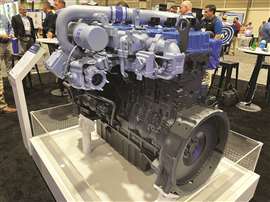 Mesa showed this non-functioning HDI hydrogen engine at PowerGen 2024. A working model was on hand at PowerGen 2025. (Photo: Becky Schultz)
Mesa showed this non-functioning HDI hydrogen engine at PowerGen 2024. A working model was on hand at PowerGen 2025. (Photo: Becky Schultz)
“What we plan to do over the next couple of years is take that engine and figure out how to turn that into a generator notionally similar to the other generators that we make that run on natural gas only,” said Tom Poteet, vice president, Corporate Development, Mesa Industrial. “This would be a carbon-free internal combustion engine.”
Supplying clean hydrogen to that gen-set will be an on-site solution that Modern Hydrogen is developing that uses pyrolysis technologies (extreme high temperature with no oxygen present) to convert natural gas to hydrogen and commercially useful carbon solids.
“The value that we’re interested in is all the carbon drops out and it produces pure hydrogen,” said Poteet. “They’re still in development of this device. They have a couple of prototypes out, but the commercial device is probably two years away.”
Over the next two years, the partners will individually develop their solutions while jointly exploring how Mesa’s hydrogen-powered gen-set and Modern Hydrogen’s on-site hydrogen production system can be optimally paired to meet the needs of customers. The initial target will be smaller data centers, many of which are focused on edge computing.
“Most of those edge data centers are probably in that 5- to 10-MW range. That’s what we intend to explore in league with Modern Hydrogen over the next couple of years,” Poteet said. “Cooperatively, we’ll be trying to flesh out this data center market to validate the market for the product.”
A Win-Win-Win
“Data center power requirements are exploding,” Poteet continued. “It’s going to require a lot of power. We’re entertaining quite a few proposals to deploy our natural gas generators in hundreds of megawatts… Our basic unit at a standby rating is about 500 KW. So, for a 100-MW load, that’s like 200 of our generators sitting out there.”
Supplying a microgrid setup such as this entails being able to plug the generators directly into the natural gas connection. That’s why Mesa sought a similar solution for a hydrogen gen-set, albeit initially on a smaller scale.
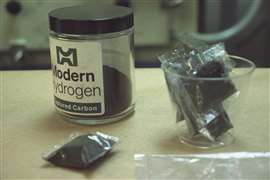 In addition to hydrogen, Modern Hydrogen’s pyrolysis process extracts commercially useful carbon solids. (Photo: Modern Hydrogen)
In addition to hydrogen, Modern Hydrogen’s pyrolysis process extracts commercially useful carbon solids. (Photo: Modern Hydrogen)
“Mesa is a leader in the power generation ecosystem because of how specific they’ve been in building a business to meet the energy industry’s demand for really high service,” Mothusi Pahl, vice president of Business Development and Government Affairs, Modern Hydrogen, commented. “It really set the bar for delivering turnkey power solutions in a really bespoke, hands-on, customer-centric fashion.
“Mesa reached out to me six, eight months ago, to say, ‘Look, we’d really like to be able to just plug into Modern and a natural gas connection to get the fuel that goes into the Mesa unit. This means that Mesa can continue to deliver dispatchable, reliable power and that’s now super-low CO2 power through an integrated solution.’”
The resulting collaboration intends to deliver just such a solution, targeted to those willing to pay a premium for carbon-free electricity.
“The biggest names in the data center ecosystem are absolutely price sensitive, but they also want to deliver a lower CO2 compute power solution to their customers,” said Pahl. “By removing carbon from natural gas before that natural gas goes into the generator, it creates a really unique opportunity for the power generation service company, the data center and the process power user and, on the front end, the OEM hardware company that’s actually behind the power generation.
“Across that value chain, we see distributed natural gas pyrolysis as a dispatchable, reliable way to leverage existing assets, existing infrastructure, and deliver domestic energy security to next-generation data centers,” he continued. “That’s really the proposition in our strategic partnership with Mesa. This gives Mesa a unique pathway to get the clean molecules they need to deliver the clean power that their customers want.”
Clean Fuel Delivery
Poteet agreed. “If we build this generator that can run on hydrogen only, this gives us a solid avenue to plan on and know that there’s going to be an on-site source of hydrogen that could be applied at places that need electricity.”
In summary, Pahl stated: “We’re in the business of delivering clean fuel to power generation. If we can preconfigure that and integrate it with a company like Mesa, it means that it’s a heck of a lot easier for the data centers of the world to achieve the low CO2 compute power they want without having to contemplate ‘Where do I get the fuel? Or what’s the fuel spec? Or does it actually integrate with the OEM hardware?’ Rather, we can deliver a combined solution that everybody benefits from.”
A Modern Twist on H2 Production
Founded roughly a decade ago, Modern Hydrogen was originally built around converting heat to electricity using a solid-state technology.
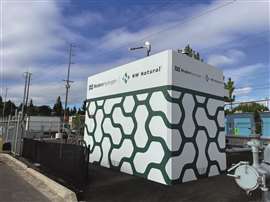 Modern Hydrogen system at NW Natural Central Resource Center, Portland, Ore. (Photo: Modern Hydrogen)
Modern Hydrogen system at NW Natural Central Resource Center, Portland, Ore. (Photo: Modern Hydrogen)
“About three years ago, we started ramping up our work in on-site hydrogen production and what we call distributed natural gas pyrolysis,” said Modern Hydrogen’s Mothusi Pahl. “We made a significant switch from running both businesses simultaneously… to focusing on distributed natural gas pyrolysis just in the last three years.”
Now, the company is “in the business of making energy cleaner and cheaper,” and it does so by removing carbon from natural gas for commercial and industrial operations, said Pahl. Its customer base includes large corporations such as manufacturers, gas utilities and other large consumers of energy, such as data centers.
Modern’s systems use high heat to crack natural gas into hydrogen and solid carbon prior to the point of combustion. “Natural gas pyrolysis just means cracking the natural gas molecule into its constituent elements: hydrogen and carbon,” Pahl said. “Pyrolysis is not new – just this idea that you’re cracking the gas into these molecules.”
The technology stack is essentially a “box” that sits along a gas pipeline and extracts gas directly from the pipe to produce hydrogen on site at or near the point of use.
“The Modern approach to pyrolysis, we say, is a distributed one, meaning that it’s not designed to be massive scale, in a centralized location where you would then put hydrogen in a truck and drive it hundreds of miles to where the user is,” Pahl explained. “Rather, we use the existing natural gas infrastructure to carry natural gas to where the load is, and then we crack the natural gas right before you need it.”
In addition to hydrogen, the process extracts commercially useful carbon solids that can be used as raw material in paving materials and other products. It can also be used as a performance-enhancing additive for asphalt binder.
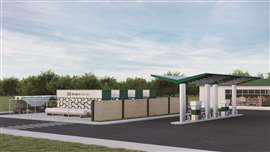 Modern Hydrogen’s approach is to produce hydrogen at the point of use. (Photo: Modern Hydrogen)
Modern Hydrogen’s approach is to produce hydrogen at the point of use. (Photo: Modern Hydrogen)
“By mixing Modern carbon additives into asphalt, the resulting asphalt performs better at higher temperatures without any degradation in low temperature performance. So it means that you get a stronger road with less service and maintenance requirements, and it’s at lower cost,” said Pahl.
“This idea of co-products from natural gas is really core to our work,” he added, “and half of our business is in the asphalt paving industry.”
Editor’s note: this story first appeared in the April 2025 issue of Power Progress.
POWER SOURCING GUIDE
The trusted reference and buyer’s guide for 83 years
The original “desktop search engine,” guiding nearly 10,000 users in more than 90 countries it is the primary reference for specifications and details on all the components that go into engine systems.
Visit Now
STAY CONNECTED




Receive the information you need when you need it through our world-leading magazines, newsletters and daily briefings.
CONNECT WITH THE TEAM









